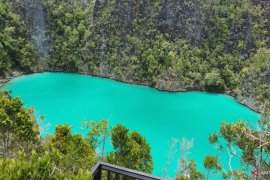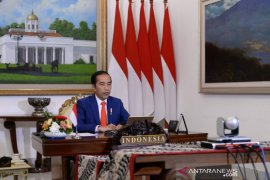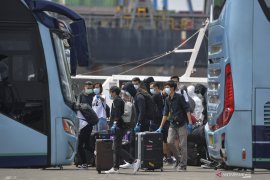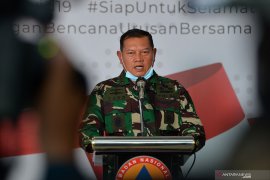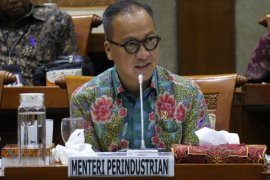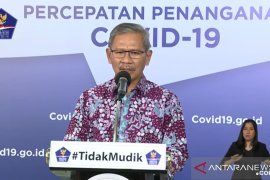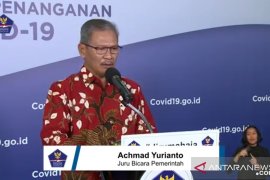This was in accordance with a Memorandum of Understanding (MOU) on defense industry signed by the two countries when President Susilo Bambang Yudhoyono had visited Turkey in June 2010.
At a closed-door meeting at the Indonesian Parliament building on June 30, 2014, the Indonesian government and the House of Representatives (DPR) had agreed to begin the deliberation of a bill to ratify the defense industry agreement between Indonesia and Turkey.
"We have agreed to introduce the bill in a plenary meeting," T.B. Hasanuddin, the deputy chairman of the House Commission I, remarked following the meeting, which was attended by Chief of the House Commission I Mahfudz Siddiq, Defense Minister Purnomo Yusgiantoro, Foreign Minister Marty Natalegawa, and several officials from the law and human rights ministry, among others.
The plenary meeting to endorse the bill into law will be held soon, probably next week, according to Hasanuddin.
The cooperation in the development of the defense industry is aimed at not only forging bilateral relations but also creating job opportunities by manufacturing defense instruments used in many countries, remarked Hassanudin, who is also a politician of the Indonesian Democratic Party of Struggle (PDIP).
Minister Marty Natalegawa applauded the House of Representatives move to deliberate the bill. Both the House Commission and the government shared the same view on the importance of the agreement in the field of defense industry, he said, adding that the cooperation was part of comprehensive relations between the two nations. "So, this is a very strategic move," he noted.
Marty said that the agreement did not cover the sale and purchase of weapon systems but was aimed at developing the capacity of the defense industries of both countries.
He added that the House Commission and the ministry had agreed to endorse the bill. "This clearly reflects the partnership between the government and the parliament, and in this case especially the House Commission I, which is worth appreciating," Marty Natalegawa noted after the meeting with House Commission I overseeing foreign affairs and defense.
Bilateral relations between Turkey and Indonesia have been strengthened following the visits of Indonesian President Susilo Bambang Yudhoyono to Turkey in June 2010 and Turkish President Abdullah Gul to Jakarta in early April 2011.
The two leaders visits were historic for both nations because Yudhoyonos visit was the first by an Indonesian president to Turkey in the last 25 years, while Guls visit was the first by a Turkish president to Jakarta in the last few years.
Yudhoyono and Gul had expressed commitment to stronger bilateral ties and witnessed the signing of various MOUs, among other initiatives on cooperation in the fields of politics, defense industry, small and medium businesses, and joint programs to increase investment.
They had particularly set an ambitious target to step up their bilateral trade to US$5 billion by 2015. In 2011, bilateral trade figures had reached US$2.24 billion or almost half the target.
Concerning the bilateral cooperation in defense field, Volkan Bozkir, the chairman of the Turkish Parliaments Foreign Affairs Committee, when visiting Jakarta in September 2012, stated that his country was very advanced in the defense industry and ready to establish cooperation in the sphere with Indonesia.
The Turkish governments willingness to support the revitalization of Indonesias defense industry was also expressed earlier when a seven-member Indonesian parliamentarian delegation headed by Mahfudz Siddiq made a three-day working visit to Turkey in April 2011.
During the visit, the DPR commission I delegation, which was accompanied by Indonesian Ambassador to Turkey Nahari Agustini, was received by President Abdullah Gul and visited several defense industries such as MKEK, T.A.I. (Turkish Aerospace Industry), Roketsan, FNSS, shipbuilding industry DEARSAN, and Nurol Holding.
President Gul convinced the Indonesian legislators on the significance of Indonesian-Turkish bilateral relations. He said at the Cankaya Palace, in Ankara on April 19, that bilateral ties with Indonesia were among the most important for his country.
In the Ankara meeting, the legislators of both the countries had agreed to encourage close cooperation in the fields of military and defense industry.
"We have agreed to encourage and support the MoU in the fields of military cooperation and defense industry that President Susilo Bambang Yudhoyono and President Abdullah Gul have signed," Mahfudz Siddiq said.
According to a media report, an agreement to jointly develop a new medium tank was signed between the Indonesian and Turkish governments in Jakarta, Indonesia, in February 2014. The new medium tank will be of a conventional design, fitted with a turret armed with a 105-mm rifle and 7.62 mm coaxial machine gun coupled to a computerized fire control system.
For ease of deployment in Indonesia, it is expected to have a combat weight of around 25 tons. Turkish company FNSS Savunma Sistemleri will work with Indonesian company PT Pindad to develop the tank for the Indonesian Army.
Daily Sabah reported on March 11, 2014, that the Turkish defense industry exports $1.4 billion (TL 3.11 billion) worth of arms each year but now has its sights set on being one of the worlds top defense exporters. Turkeys defense sector, which currently ranks eighth in the world in arms exports, is aimed at finding foreign buyers for $2 billion worth of arms and overtaking Italys global ranking as sixth.
Meanwhile, ReportsnReports.com reported that according to a new report titled "Future of the MINT (Mexico, Indonesia, Nigeria and Turkey) Defense Industry - Market Attractiveness, Competitive Landscape and Forecasts to 2019," the MINT region is expected to increase its defense expenditure from US$40.6 billion to US$61.1 billion over the forecast period.
Turkey, with a cumulative budget allocation of over US$100 billion over the forecast period, is the major contributor in the region, followed by Indonesia, with US$88.4 billion; Mexico, with US$46.4 billion; and Nigeria, with approximately US$20 billion, stated the report distributed by PRWire Service recently. (*)
(f001/INE/a014)
Reporter: Fardah
Editor: Fardah Assegaf
Copyright © ANTARA 2014



